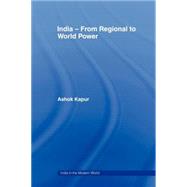
Note: Supplemental materials are not guaranteed with Rental or Used book purchases.
Purchase Benefits
What is included with this book?
| Introduction: India as a Catalyst | |
| Shifts in Indian Diplomatic History | |
| Strategic Triangles and the Indian Subcontinent | |
| Indian Strategic Debates and Dilemmas: Analytical Constructs | |
| Nature of India's Foreign Policy: Utopia, Compromise Pease or Engagement? | |
| The Build-up of the Suzerain States' System in the Subcontinent, 1947 - 1990s | |
| The Typology of Threats to India and The Nehruvian Record, 1964-98 | |
| Nehru's Innovations and Their Problems | |
| Nehruvians and the Rise of Anti-India Trends in Foreign Affairs | |
| The External Determinants of Change in Indian Foreign Affairs, 1960s - 1990s | |
| India's Antagonists Re-Group, 1971-1980s | |
| Liberating India and Its Nuclear Policy From the Nehruvian Shackles | |
| India's Rise as a Major Power, 1990s | |
| BJP's Geopolitics and Building Strategic Triangularities | |
| Epilogue | |
| Table of Contents provided by Publisher. All Rights Reserved. |
The New copy of this book will include any supplemental materials advertised. Please check the title of the book to determine if it should include any access cards, study guides, lab manuals, CDs, etc.
The Used, Rental and eBook copies of this book are not guaranteed to include any supplemental materials. Typically, only the book itself is included. This is true even if the title states it includes any access cards, study guides, lab manuals, CDs, etc.